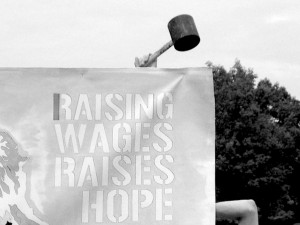Raising the minimum wage has a negligible effect on jobs
29th September 2015 · 0 Comments
By William Spriggs
Contributing Writer
(TriceEdneyWire.com) — As states, cities and municipalities across the country raise wages to improve the lives of working people, it is worth highlighting how such moves affect low-income communities of color.
Many argue that higher wages hurt job growth. Here’s why that thinking is wrong.
The Congressional Budget Office, in an extensive review of the available research on the effects of the minimum wage, found that as many studies found job gains as found job losses, with the average estimate being that increases in the minimum wage have no measurable effect on employment. Digging more deeply into the studies’ various methodologies, the CBO noted that the best and most convincing studies looked specifically at instances in which minimum wages were increased in localities where bordering jurisdictions did not raise their minimum wage. The CBO found that in those studies, no significant employment effects were observed in the localities that raised their minimum wage compared with employment in the bordering communities. On that basis, the current consensus among economists is that raising the minimum wage has negligible effects on employment. 
During the expansion of private-sector employment that began in 2010, and is now at record length, many states and localities have raised their minimum wage. Despite this, the sector most sensitive to increases in the minimum wage-the fast-food restaurant sector-has seen the greatest job growth of any sector. Job growth in those states with higher minimum wages is not lagging job growth in states that have failed to raise their minimum wage; again, this is true when looking at neighboring states with different minimum wages.
It continues to be the case that minimum wages are presented as a creator or destroyer of jobs. In reality, job growth is driven by rising incomes and growing customer bases that demand products, prompting businesses to respond by hiring more people to increase their output and serve the growing customer demand. Low wages do not create jobs or expand customer bases.
An error often repeated within the Black community confuses the notion of not employed with unemployed. These are two separate concepts, and economists use them to understand the policy solution. The Black community suffers from a very high unemployment rate-the share of people actively trying to find work. Nationally, while the number of unemployed people per job opening has come down, it remains higher than when the labor market peaks at slightly fewer than two unemployed people per job opening. The Black community also suffers from a low labor-force participation rate, which is the share of people either employed or looking for work-those who are active members of the labor market.
Because of high unemployment rates, Black working people are far more likely than white working people to accept low-wage work. Among households with full-time year-round working people, 9.2 percent of Black families live in poverty compared with 3.4 percent of white families; among female-headed households in the Black community, it’s 18.1 percent. At every level of educational attainment, Black income is less than white income, just as at every level of educational attainment, Black unemployment rates are higher than those of whites. Lowering Black people’s wages will not close the unemployment gap faced by Black working families.
Blacks will work for less, but that doesn’t mean Blacks will work for anything. Some are not active in the labor market because of discouragement over limited job openings. However, many are discouraged not over job openings but over wages. Non-employment includes both those who are unemployed-actively looking for work-and those not in the labor force at all, such as young people who would rather pursue more education than take low wages, mothers who can’t afford transportation and child care expenses at low wages, and non-custodial fathers who wouldn’t net an income at low wages after paying for transportation and child support.
Raising wages will increase Black labor-force participation. More Black working people will continue to be engaged in job search if the jobs they are chasing pay higher wages. Working and being poor can be a poverty trap itself. Those who want to help the Black community should work to raise the wages of the jobs that Black people find themselves locked into. Raising wages for Black working families means that money will support the growth and survival of businesses in their community.
This article originally published in the September 28, 2015 print edition of The Louisiana Weekly newspaper.



